Home » Posts tagged 'scholarship'
Tag Archives: scholarship
Frank Pezzella Wants Increased Accountability on Hate Crime Reporting
During the chaotic years of the Trump Administration, the United States experienced a rise in hate crimes. This increase has been confirmed by FBI data collection, media reporting, and independent scholarship. According to Dr. Frank Pezzella, an Associate Professor of Criminal Justice at John Jay College and a scholar of hate crimes, four out of the past five years, from 2015 to 2019, have seen consecutive increases in hate crime offending in this country, something he says is new. Nine of the ten largest American cities had the most dramatic increases in hate crimes – including New York City.
Hate crimes, or bias crimes, are strictly defined by the FBI. The organization sets out 14 indicators that must be present for a criminal offense to be classified as a hate or bias crime, that provide objective evidence that the crime was motivated by bias. But according to Dr. Pezzella, the evidence to meet those criteria isn’t always clear. Not every hate crime is as flagrant as the Pulse nightclub shooting in 2016 or the 2018 attack on Pittsburgh’s Tree of Life Synagogue. To establish a hate crime was committed, first responding police officers must look for evidence of bias motivation – what Pezzella calls an “elevated mens rea” requirement. But bias can only be committed against legally protected categories, like race and ethnicity, sexual or gender orientation, disability, or religion, which vary from state to state. And the additional paperwork and procedural requirements that come with classifying an incident as a hate crime are, in his words, disincentivizing police reporting.
Undercounting Hate Crimes
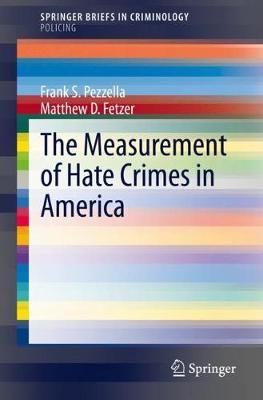 The result of these complications is rampant underreporting. In his new book, The Measurement of Hate Crimes in America, Dr. Pezzella looks at the reasons why hate crimes are so undercounted in the United States, and proposes some solutions for what law enforcement and policymakers can do to correct the issue. Since the enactment of the federal Hate Crimes Statistics Act in 1990, which required the Attorney General to collect data about hate crimes, the FBI has been fulfilling this mandate in the form of the Hate Crime Statistics Program, published annually as part of the Uniform Crime Report. According to Dr. Pezzella, since 1990 the UCR has reported an average of roughly 8,000 hate crimes per year; but victims, he says, report around 250,000 hate crimes per year. He attributes this substantial gap to a variety of factors including the evidentiary and procedural barriers noted above. In addition, only about 100,000 of these victimizations are ever reported to the police in the first place. And when victims do report, police departments are under no legal requirement to pass their findings on to the FBI.
The result of these complications is rampant underreporting. In his new book, The Measurement of Hate Crimes in America, Dr. Pezzella looks at the reasons why hate crimes are so undercounted in the United States, and proposes some solutions for what law enforcement and policymakers can do to correct the issue. Since the enactment of the federal Hate Crimes Statistics Act in 1990, which required the Attorney General to collect data about hate crimes, the FBI has been fulfilling this mandate in the form of the Hate Crime Statistics Program, published annually as part of the Uniform Crime Report. According to Dr. Pezzella, since 1990 the UCR has reported an average of roughly 8,000 hate crimes per year; but victims, he says, report around 250,000 hate crimes per year. He attributes this substantial gap to a variety of factors including the evidentiary and procedural barriers noted above. In addition, only about 100,000 of these victimizations are ever reported to the police in the first place. And when victims do report, police departments are under no legal requirement to pass their findings on to the FBI.
“Of the roughly 18,500 police departments, only maybe 75% participate in the Uniform Crime Report hate crime reporting program – note that it is voluntary,” says Pezzella. “So we don’t even know about hate crimes in 25% of precincts. And of the participating 75%, roughly 90% report zero hate crimes every year. So one of the reasons we wrote the book is that, either we don’t have hate crimes the way we think we do, or we have a systemic reporting problem.” It’s obvious which he believes is true.
The consequences of underreporting hate crimes are severe, Dr. Pezzella says. “To the extent that we underreport both the type and extent of victimization, it really does put a specific policy issue in front of us. We need to know who’s being affected, how they’re being affected, and the extent of the effect, in order to fashion remedies.” The only way to target treatment and services for the most vulnerable and likely victims is through accurate reporting.
Remedying Undercounting
In order to remedy undercounting and better target policy, Dr. Pezzella presents a number of recommendations in The Measurement of Hate Crimes in America. He calls for changes to take place within police departments, at the level of state and local politics, and in the criminal legal system. First, he suggests that every precinct have a written and clearly posted hate crime policy, and that every officer be trained to understand the rules for identifying bias crimes and the statutes governing them in their particular state. He would also like to see greater police-community engagement on this issue, with better tracking of non-criminal bias incidents – like seeing a swastika or other racist tag in the neighborhood – which Pezzella says often lead to violent bias crimes. He would especially like to see hate crime reporting made mandatory, with penalties or audits following a departmental report of zero bias crimes in a year.
Stepping out of police departments, Dr. Pezzella also calls for greater engagement from state and local politicians, who after all control the purse strings as well as set state legislation, but who are often hesitant to call attention to a problem with hate crimes in their district. Finally, he wants prosecutors’ offices to commit to seeking hate crime convictions, rather than settling for the easier task of convicting an offender for non-bias equivalents. With every actor across the board invested in tackling hate crimes and being transparent and proactive about applying best practices, offenders are put on notice that the community, including police, won’t allow these harmful crimes to continue.
Vicarious Victimization
Dr. Pezzella has been studying hate crimes since his graduate school years at SUNY-Albany, but he doesn’t feel he’s reached the end of this line of research. Going forward, he is interested in studying the deleterious and vicarious effects hate crimes can have on the victims’ communities. Because bias-motivated offenders target victims based on what they are rather than what they do, Dr. Pezzella says, there is a sense that anyone could become the next victim. This impersonal threat undermines societal ideals of trust and equality, and can even affect property values, as whole groups feel unsafe in certain areas and may be forced to relocate. Pezzella also mentions the psychological and emotional impacts of feeling under threat for simply being who and what you are. “When a victim goes home and says they were a victim of a hate crime, in what way does it impact the quality of life or sense of safety for secondary victims [i.e., the victim’s community]?” he asks. “What do they do? While we understand the direct impact, we know less about this vicarious impact, and how far it extends beyond the primary victim.”
He also has his eye on current events, especially the rise of domestic terrorism in the United States. Dr. Pezzella is concerned about the growing number of organized hate groups in recent years, and how emboldened they have been by rhetoric from the top levels of government. While many mass shootings have been categorized as domestic terrorism, Pezzella also sees evidence of bias that might categorize these events as hate crimes. If they are being left out of crucial counts that help to allocate resources and fight back against hate in this country, he wants to know.
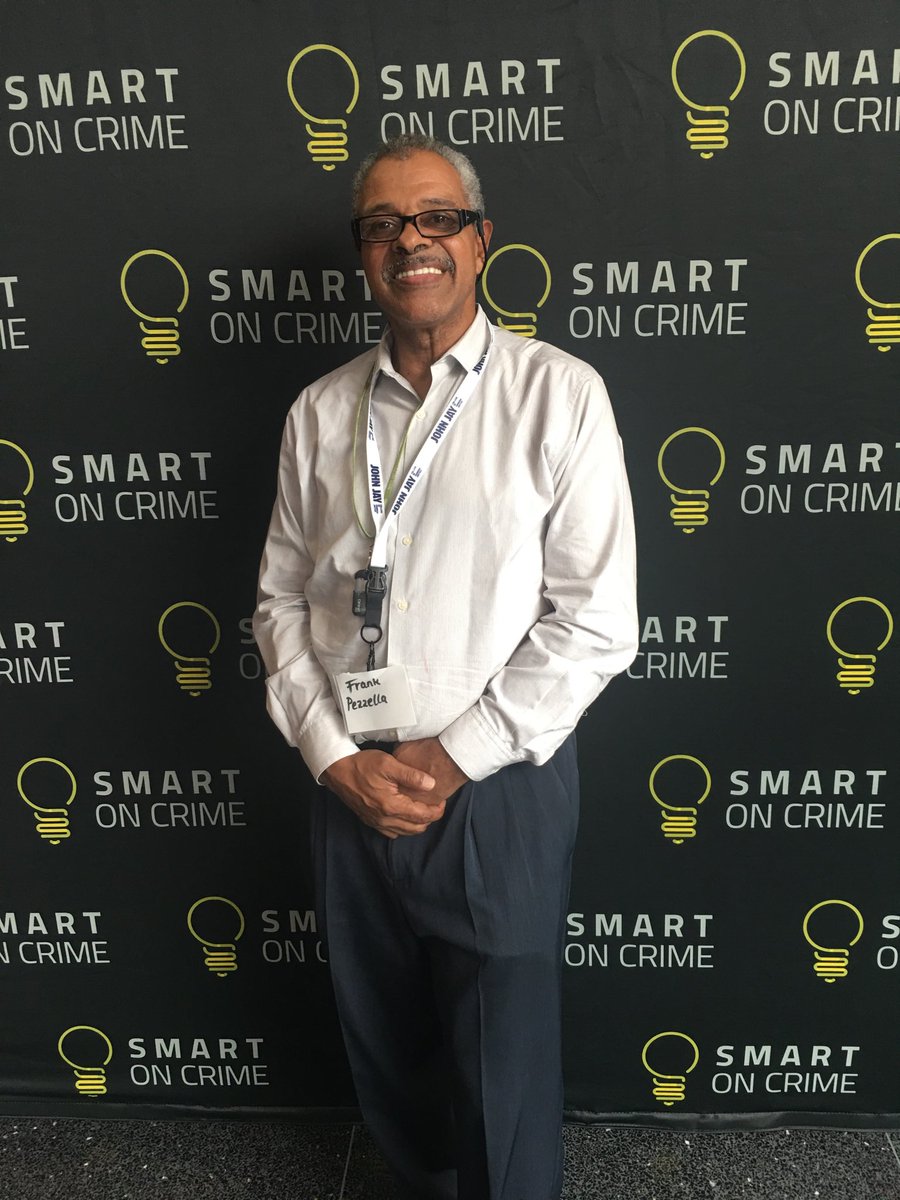 Dr. Frank Pezzella is an Associate Professor of Criminal Justice at John Jay College. His primary research focus is on the causes, correlates, and consequences of hate crimes victimizations. He also conducts research on issues that relate to race, crime and justice. In addition to his most recent book, he is also the author of Hate Crime Statutes: A Public Policy and Law Enforcement Dilemma, as well as numerous peer-reviewed articles.
Dr. Frank Pezzella is an Associate Professor of Criminal Justice at John Jay College. His primary research focus is on the causes, correlates, and consequences of hate crimes victimizations. He also conducts research on issues that relate to race, crime and justice. In addition to his most recent book, he is also the author of Hate Crime Statutes: A Public Policy and Law Enforcement Dilemma, as well as numerous peer-reviewed articles.
Podcasting at John Jay: Making Research Accessible
If you’re like us, you love podcasts enough that you’ve subscribed to more than you can listen to in a week of subway commutes. Podcasting, then called online radio, rose in popularity with the proliferation of mp3 players in the early 2000s. In tandem with other personal platforms like blogs, podcasts exemplified the “democratizing spirit” of the internet.
Today, they are big business. Since the release of Serial in 2014, podcasts have boomed. Monthly listeners have nearly doubled since 2014, from around 39 million Americans to an estimated 90 million. As the listening audience grows, quality improves, and bigger names get interested in the medium, advertisers are investing millions.
At John Jay, interest in podcasting has risen along with the medium’s growing potential. The college is home to a variety of podcasts, run by students, faculty and staff, on a rainbow of topics. For example, students in the English department work with Professor Christen Madrazo to write, produce, and edit Life Out Loud, which highlights the diverse voices and real stories of John Jay’s student body. We also have faculty working on podcasts hosted outside John Jay, podcasts run by research centers, and faculty and staff who produce their own shows, right here on campus.
We will introduce you to two homegrown John Jay podcasts that seek to translate scholarship into a form that everyone can understand. Meet Kathleen Collins, a Reference Librarian and Professor at John Jay College, and Nick Rodrigo, a CUNY Ph.D. candidate and John Jay College adjunct professor. While Kathleen is on her 38th episode of podcast Indoor Voices, and Nick has just released the first six episodes of They Are Just Deportees, both share the desire to take CUNY research out of the ivory tower and bring it to the community.
 Kathleen Collins has been producing Indoor Voices since the summer of 2017. She started the podcast as “a way to highlight the fascinating things going on around CUNY that might not be widely known. There are so many inhabitants in the CUNYverse doing incredibly interesting things… We like being able to provide a low-stakes, easy-to-share platform for people to talk about their work.”
Kathleen Collins has been producing Indoor Voices since the summer of 2017. She started the podcast as “a way to highlight the fascinating things going on around CUNY that might not be widely known. There are so many inhabitants in the CUNYverse doing incredibly interesting things… We like being able to provide a low-stakes, easy-to-share platform for people to talk about their work.”
To Kathleen, the conversations are the key element. She and her co-host, La Guardia Community College librarian Steven Ovadia, interview CUNY faculty, students, alumni and staff members about their research or creative output; they have a great deal of leeway to highlight what interests them.
 Nick Rodrigo is new to podcasting, overcoming challenges as he meets them in the course of creating They Are Just Deportees. The newly-launched show examines the various ways in which the U.S. immigration enforcement system shapes and controls the lives of migrant communities in this country. With co-host Darializa Avila Chevalier, TAJD helps listeners to understand “the multiple sites of border enforcement in the U.S., and the punitive effects of the country’s periodic moral panics on the ‘criminal alien.'”
Nick Rodrigo is new to podcasting, overcoming challenges as he meets them in the course of creating They Are Just Deportees. The newly-launched show examines the various ways in which the U.S. immigration enforcement system shapes and controls the lives of migrant communities in this country. With co-host Darializa Avila Chevalier, TAJD helps listeners to understand “the multiple sites of border enforcement in the U.S., and the punitive effects of the country’s periodic moral panics on the ‘criminal alien.'”
Nick, and his associates in the Social Anatomy of a Deportation Regime Working Group (the sponsor of the podcast), think this is a particularly relevant topic. “Immigrant rights have come under increasing threat from the state, with bans on immigration from Muslim majority countries, the detention of children at the U.S./Mexico border, and the pledge of this administration to increase the forced removal of all undocumented people. … It is vitally important that the deportation system — which expels up to 300,000 persons a year — be placed in the historical context of this country’s treatment of the ‘other,’ while focusing on the real time implications of the current system on immigrant communities.”
For both showrunners, podcasting is a great way to make sometimes-complex issues and scholarship more accessible to an average listener. Says Nick, “two of the major issues in scholarship today are the ‘ivory tower’ mentality of academics and a lack of interdisciplinary focus on major social issues. Conferences and public lectures can be delivered in such inaccessible language that they can be alienating to non-academics. Podcasting allows for the complex issues concerning immigration enforcement to be distilled and presented to the public in a way that is accessible and digestible, with the opportunity for the listener to pause, reflect, and reengage at their own pace. Podcasting also provides a platform for criminologists, sociologists, public health experts, geographers, and journalists to come together on an issue and, if the interview structure is good, a compelling narrative for change can be constructed.”
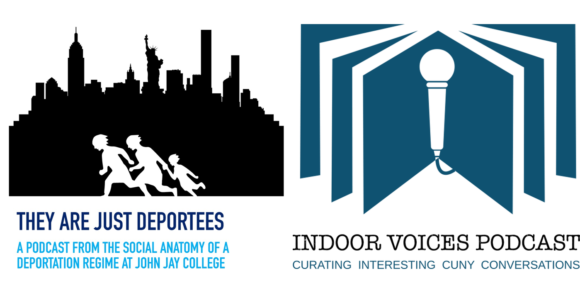
Kathleen also wants to make it easier for non-experts to engage with what CUNY produces. “There is so much going on within CUNY,” she says, “and it shouldn’t be hidden inside the academy. Podcasts are a good way to get people interested in new things — it’s a mini, portable seminar for your ears. But since Steve and I act as generalists in our role as interviewers, we can hopefully elicit a layman’s interpretation of what scholars are thinking and writing about. The point is to bring attention to the author or artist, and ask about their research and writing process and teaching — these topics bring the conversation to a universal level.”
Creating content to fit the platform can sometimes be challenging. Nick was “forced to learn new skills on the job,” but found that his struggles with editing gradually turned into confidence! Kathleen cites the extensive support and inspiration from other podcasters and staff at the college as a source of her success and joy in creating Indoor Voices.
In the end, she says she loves every episode she produces — thanks to the satisfying conversations and intimate connections she can form with guests during a 40 minute interview, each new episode supplants the last as her new favorite.
Check out the latest episodes of Indoor Voices, They Are Just Deportees, and more John Jay podcasts:
- Indoor Voices: J Journal founders Adam Berlin and Jeffrey Heiman have been producing the literary magazine for twelve years. The high quality creative work they feature deals with contemporary justice issues, but not always in a way you might expect.
- They Are Just Deportees: You can find the first six episodes on the Social Anatomy of a Deportation Regime website, or by searching on Spotify.
- Reentry Radio: The latest episode of the podcast produced by John Jay’s Prisoner Reentry Institute deals with employment discrimination against justice-involved individuals, with special guest Melissa Ader of the Legal Aid Society’s Worker Justice Project.
- This World of Humans: Host Nathan Lents talks to Hunter College researcher Dr. Jill Bargonetti about using mouse models to study triple-negative breast cancer.
Research Productivity 2018: A Thread
In June 2019, OAR shared a few of our 2018 most productive scholars with our Twitter followers. Check out the whole thread below, and don’t forget to follow @JohnJayResearch and the researchers mentioned below to get more information in real time!
Last year we recorded more than 700 journal articles and book chapters published by @JohnJayCollege faculty members! While we finish adding up this year’s #JJCResearch productivity, we want to introduce you to some of our most productive #JJCFaculty scholars
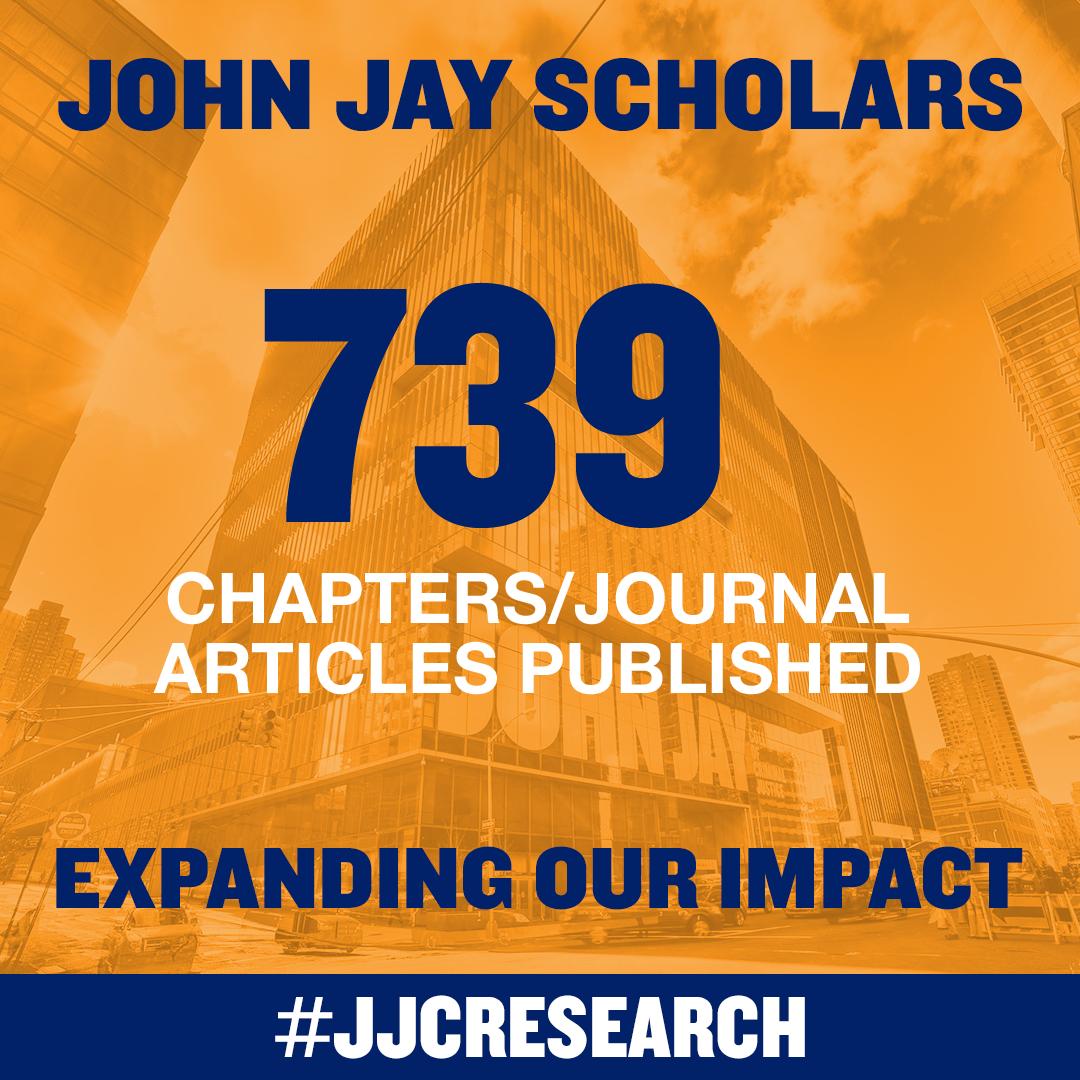
First up is @ktwolff11, who also won the 2019 Scholarly Excellence Award and the Donal EJ MacNamara Award for significant scholarly contributions to #criminaljustice! His most recently published article examines patterns of recidivism after a sex offense, find it here: (bit.ly/2XaqWmw)
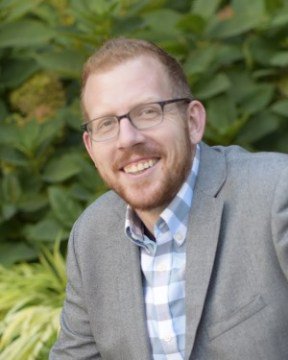
Next is @kevinnadal, @JohnJayCollege professor of psychology and the author/editor of two books in 2018! His research explores the impacts of microaggressions on the mental health of marginalized groups including people of color, women, LGBTQ individuals, & more. #JJCResearch
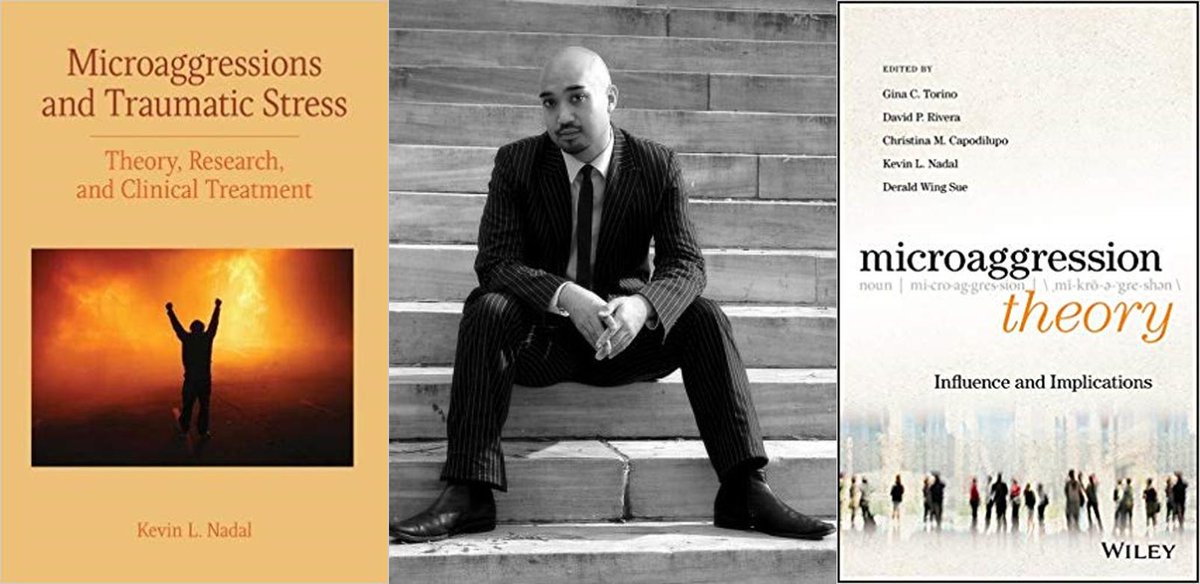
Today’s ft. #JJCFaculty scholar is @ElizabethJeglic, who published 2 books, 9 peer-reviewed articles, 6 book chapters, and 7 online articles and blogs last year!! Her research focuses on sexual violence prevention — her latest article is in journal ‘Sexual Abuse’ #JJCResearch

Next up is @JohnJayCollege criminal justice prof @PizaEric. Not only is he often featured by the media as an expert on policing matters, but he published 13 journal articles in 2018 on the data behind risk-based policing, CCTV, and more! #JJCResearch
Do you know @JohnJayCollege poli sci prof Samantha Majic? An OAR #BookTalk alum (), last year she published new book “Youth Who Trade Sex in the U.S.” and has been speaking and writing about the harms of & issues surrounding sex trafficking. #JJCResearch
You can watch her 2014 book talk here: (bit.ly/2KAdH8P)
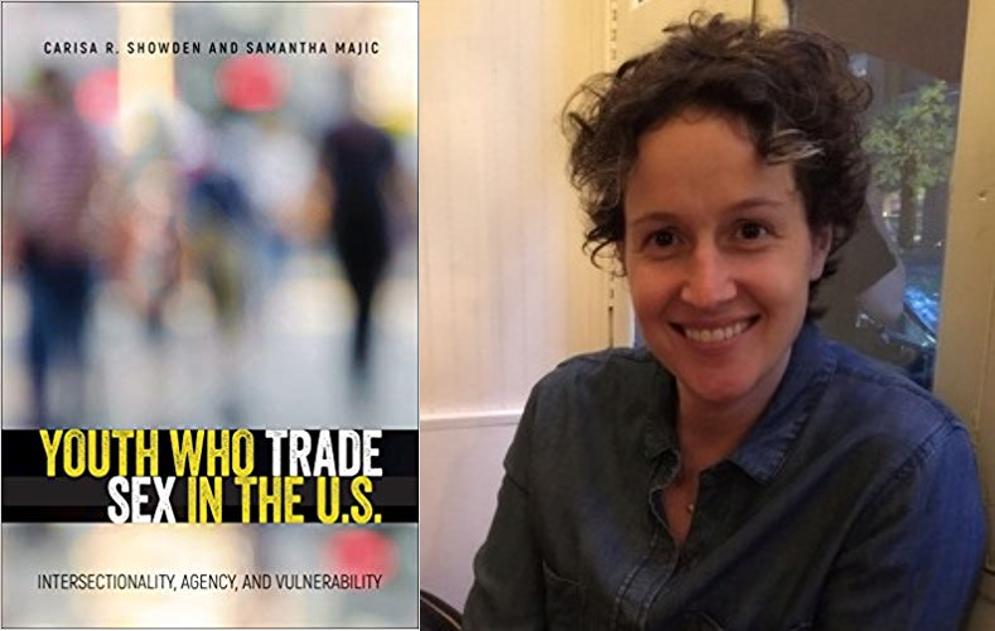
Last year, @DrMazzula, who is the founder of the @LatinaRAS as well as a @JohnJayCollege prof, kept busy writing and presenting about two key issues: microaggressions, and gender/minority representation in academia. #thisiswhataprofessorlookslike #JJCResearch
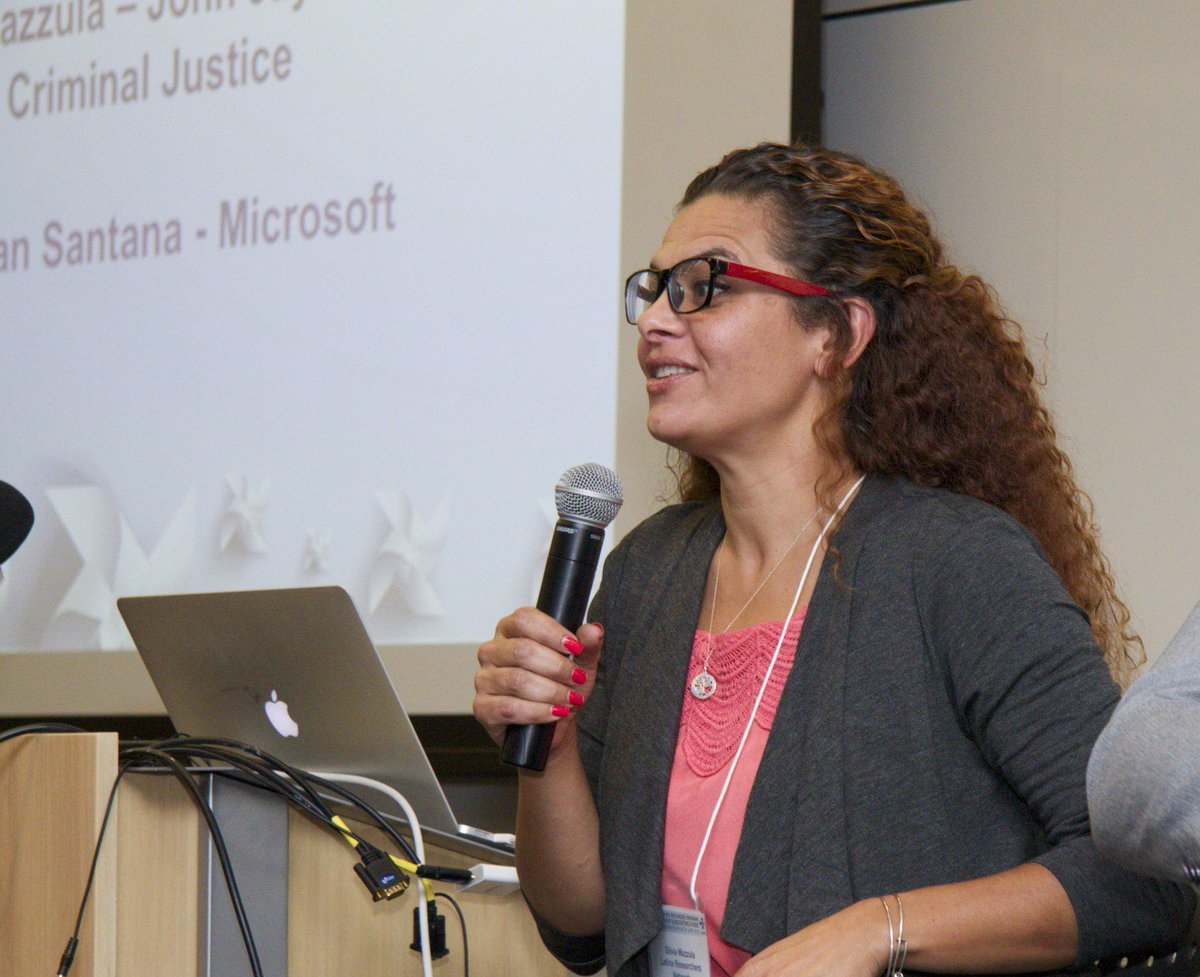
And don’t forget Philip Yanos, who in 2018 not only published his book ‘Written Off,’ but also a monthly column in @PsychToday by the same name. His articles, on stigma attached to mental illness, were cited more than 700 times last year!
#JJCResearch
Find his blog here: (bit.ly/2IQ2w9J)
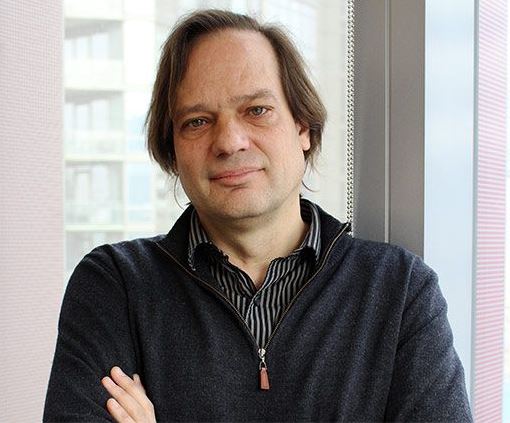
And last but not least, @JohnJayCollege is home to some great podcasts. Check out @indoorvoicespod, @TWOH_VL, @NewBooksPoliSci, @QualityPolicing, @JohnJayTLC on Teaching and Learning, and @lavueltablog. So much to learn about!



Recent Comments